Institutional case study: the University of Liverpool
Published:09/12/2024 by James Reynolds Reading time:11 minutes

'As a senior postdoc, I started the cohort ready to take the next step in my career, but lacked confidence and clarity in making a decision. Working with Prosper and allocating time to meaningfully consider my options gave me the nudge I needed to take the next steps.'
Cohort member feedback
Continuing our series of institutional case studies looking at the different ways institutions are using Prosper, today we're featuring the 'home' of Prosper - the University of Liverpool - and looking at how the Prosper team has embedded Prosper within the University since launch.
The case study can also be downloaded here.
Key stats
- Mode of delivery: 3
- Cost: ~£9000 (for career coaching, session facilitation and catering - NB costs for facilitation higher than for other HEIs due to requirement for open access resources for the Portal)
- FTE resource: 1 (with some additional admin support)
- 30 postdocs
- 6 months
- 13 sessions
- 28 hours of development per postdoc
- 6.5 hours of group coaching per postdoc
- 83% of cohort members stated they would recommend Prosper
'I have learnt a lot about how to appraise what I actually want from my career - and my life outside of it - and the steps I need to take to get there. I've learned how to take those skills and experiences that we often take for granted as postdocs, and recognise the value they offer to employers. I've also learned valuable strategies for finding new career options and making connections.'
Cohort member feedback
Context and background
'Prosper definitely helped me with looking at the bigger picture in terms of what I want from a career and the things I value most.'
Cohort member feedback
Dubbed ‘the original redbrick’, the University of Liverpool is a founding member of the Russell Group and internationally-renowned centre of research, with a postdoc population of around 900 spread across its three faculties of Health and Life Sciences, Humanities and Social Sciences, and Science and Engineering.
It is also the ‘home’ of Prosper, which sits within the University’s Leadership, Organisational, Professional & Academic Development Academy.
How was Prosper used?
'Prosper has taught me how to better generalise my skills, experiences, and motivations'
Cohort member feedback
Given the success of the cohort model during the pilots, the Prosper team opted to continue with this approach, recruiting a cohort of 30 postdocs – keeping the application process as simple and inclusive as possible, and aiming to recruit a diverse group in terms of discipline, gender and ethnicity (see figures below).
Cohort makeup by disciplinary area:
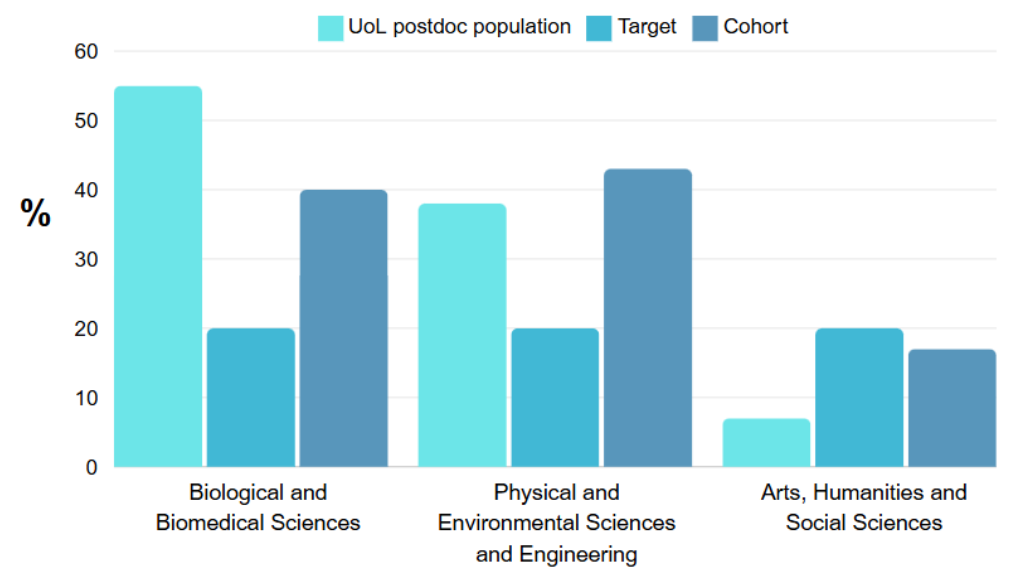
Cohort makeup by gender:
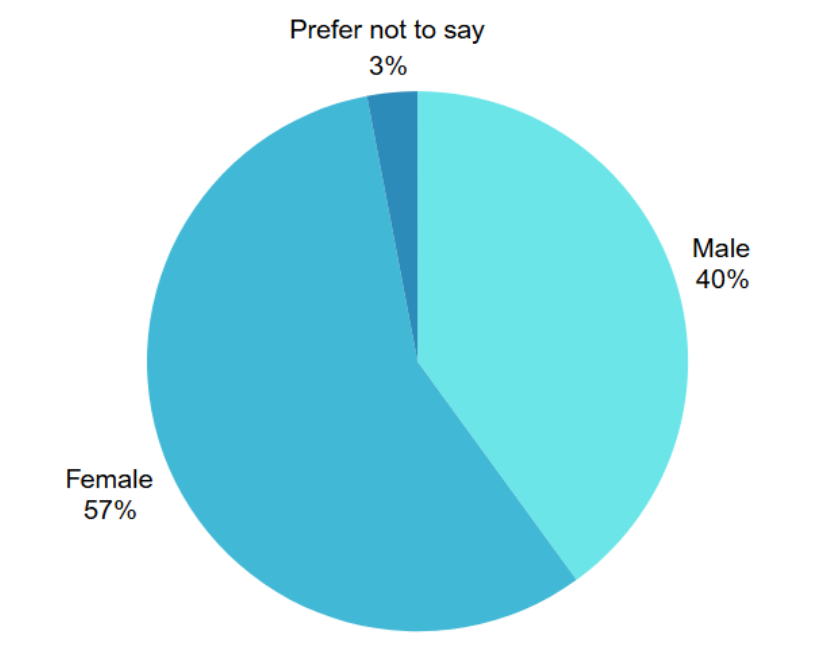
Cohort makeup by ethnicity:
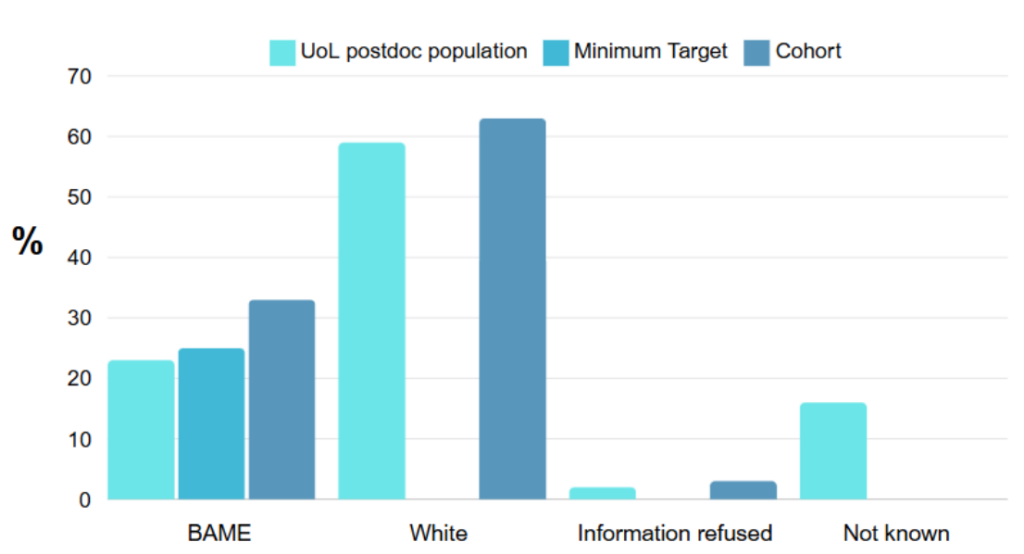
In addition to the above, 57% of the cohort were the first in their family to graduate from university.
Prosper opted for a 6-month cohort, running between February and July 2024. This duration was decided on after consultation with professional career coaches who had worked with the pilot cohorts. The timing within the academic year was chosen so as to avoid the summer break (August) and start of academic year (September/October).
'When I joined Prosper, I gained clarity on my career path. I now focus on my strengths and what gives me energy. I only apply for jobs that align with my values. Although I am still uncertain whether to stay in academia, I'm more intentional about my work. My job satisfaction has increased since I joined Prosper.'
Cohort member feedback
The cohort proceeded through Prosper’s Reflect, Explore and Act themes, with two months for each. Participants had access to a series of sessions covering a variety of topics, with sessions being a mix of online and in-person. Some sessions were exclusively open to the cohort, with others being open to postdocs across the university. Most sessions were delivered by the Prosper team, with the exception of three that were delivered by external facilitators:
- Reflect
- Cohort induction (Cohort only, in-person)
- Skills audit and values (Open, online)
- Career decision making (Open, externally facilitated, online)
- Career identity (Cohort online, online)
- Explore
- How to explore a range of career options (Open, online)
- Sunk-cost fallacy (Cohort only, in-person)
- Harnessing AI for job hunting (Open, externally facilitated, online)
- Knowing when you’ve done enough research (Cohort only, online)
- Act
- Facing setbacks (Open, externally facilitated, online)
- Intelligence sharing and job boards (Cohort only, online)
- Becoming a STAR (the STAR method) (Open, in-person)
- Maintaining your career development momentum (Cohort only, online)
- Optional drop-in, career/time planning
'The skills auditing exercise, in particular, made me realise that I have transferable skills applicable to various settings. I now understand the importance of recognizing how these skills can be relevant in different contexts and how to market them effectively.
Initially, I had reservations about pursuing careers beyond academia, as I believed I lacked the necessary experience. However, I have come to realise that my existing skills and motivation are sufficient to explore these opportunities. Most importantly, I have learned to embrace my capabilities.'
Cohort member feedback
The ability to hold in-person sessions was a major (and welcome!) change from the pilots, which had unfortunately coincided with the COVID pandemic (below is a photo from the cohort induction session).
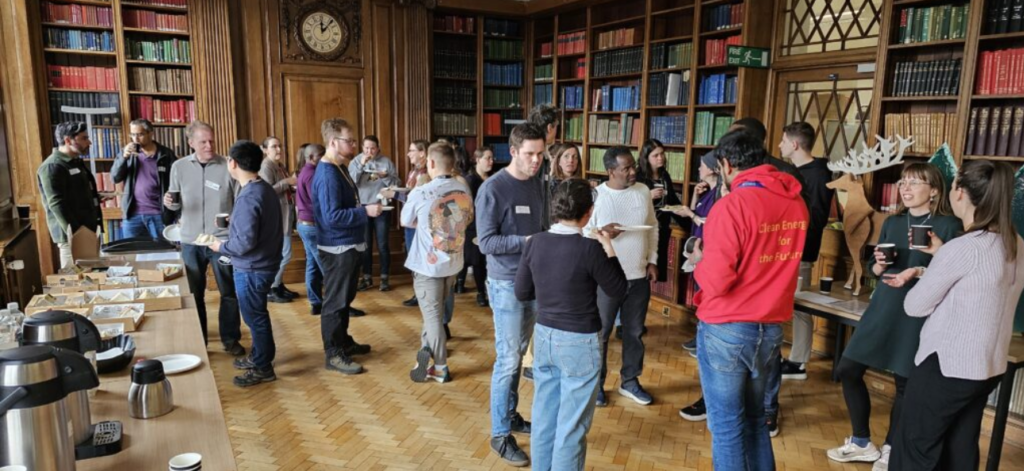
'Sessions were well thought out and well-delivered - the range of topics was excellent'
Cohort member feedback
Sessions were scheduled for no more than one per week to fit with busy workloads. External facilitators were brought in to deliver sessions that matched a particular demand and to address newly emerging topics such as using AI as part of your job-hunting strategy.
'The early self-reflection activities were incredibly useful for helping me determine what type of career I want, and what matters the most for me.'
Cohort member feedback
In addition to the development sessions, cohort members had access to group coaching, run by professional career coaches, in three groups of ten. These groups met once per month and enhanced the community element of the cohort - providing a space in which postdocs could connect with peers from other disciplines to share their thoughts, concerns, and learnings, and engage in career development on a mutual basis.
Cohort members each had half-an-hour one-to-ones with their group coaches at the start, to establish a rapport and explore what the member wanted to get out of the cohort and the coaching.
'Prosper provided a safe space for sharing career anxieties'
Cohort member feedback
Prosper additionally set up a buddy scheme to run through the cohort, on an opt-in basis. Participants were randomly sorted into groups of 3-5, with the expectation that they meet for at least half-an-hour each month for the purposes of peer accountability, for three months (at which point the groups were randomly re-mixed for the next three months).
'The buddy scheme provided an active space for co-creating community – being able to discuss any topic and meet in informal settings created the space to feel truly connected'
Cohort member feedback
Impact and evaluation
'A standout takeaway from our evaluation is just how much postdocs appreciate and value the community element that Prosper provides. The sessions and information are all crucial of course, but creating a psychologically safe, shared space where postdocs can connect and build mutual networks really makes all the difference'
Dr Fiona McBride, Senior Researcher Developer, University of Liverpool
The cohort was a success - with a majority of postdocs (83%) saying they would recommend Prosper to other postdocs.
'The cohort provided a wonderful platform to connect with others in a similar boat'
Cohort member feedback
Cohort members filled out entrance and exit surveys in order to track shifts in key metrics around confidence and ability relating to career planning and development, measured according to a 5-point Likert scale.
This measure demonstrated an average improvement in confidence across every measure (see the below chart for more detail).
'My confidence in my skills has increased and so has my self-awareness resulting in having a clearer idea of where I would and wouldn't work based on my values.'
Cohort member feedback
The cohort entry and exit surveys asked respondents to rate their confidence across a number of questions on a 1 to 5 scale:
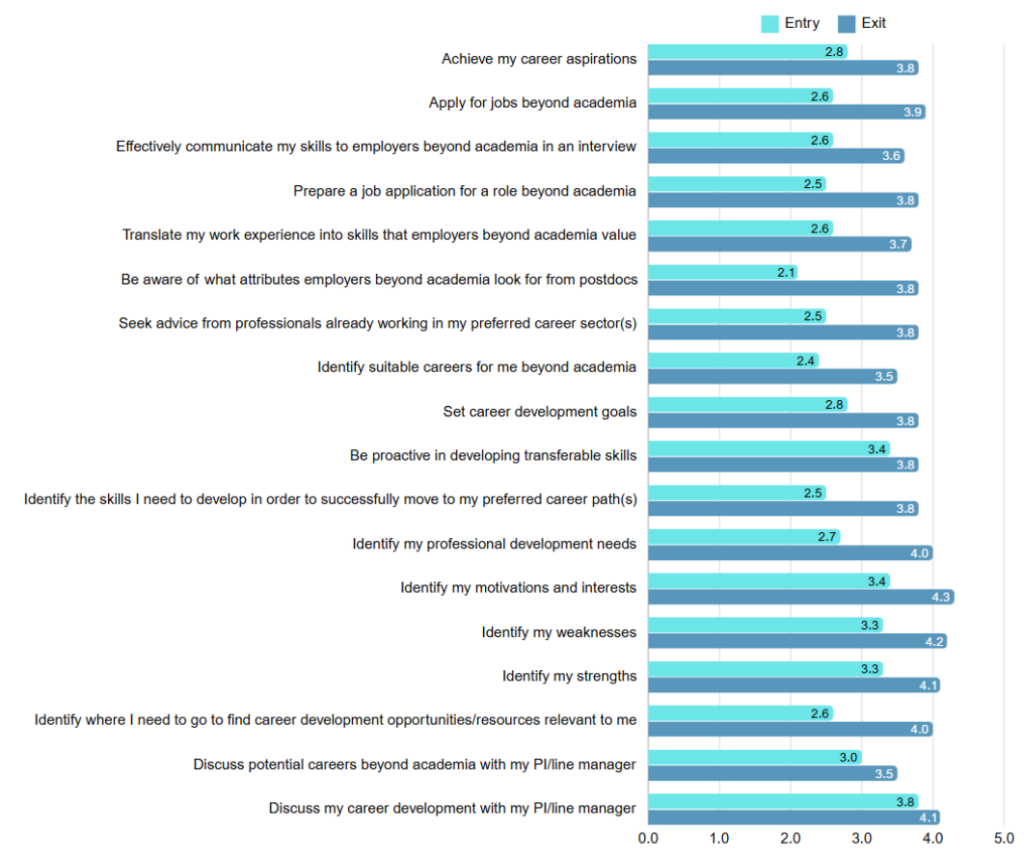
'Prosper really boosted my confidence in my communication skills.'
Cohort member feedback
The cohort was designed so that the overall time spent by each member of the cohort would fall within the 10-days minimum pro rata mandated by The Concordat the Support the Career Development of Researchers (of which the University is a signatory); data collected in the exit survey showed that participants spent an average of 28 hours in total engaging with Prosper over the course of the 6-months.
The exit survey also gave participants the opportunity to give open text feedback on the cohort - some of which can be seen scattered through this case study. Overall, cohort members found the experience to be a positive and useful for one - with participants particularly finding value in the group coaching and community element that the cohort sought to foster.
'I definitely had a positive shift in self-perception regarding my skills and career prospects. I feel more confident that there will be something for me beyond academia'
Cohort member feedback
Those who opted to participate in the buddy scheme (21 out of 30) were also asked for feedback about this element - which was positive on the whole. To quote a cohort member, “the buddy group aspect really helped as I didn't have lots of other departmental friends at similar decision points in their career.”
'The buddy scheme was great – we plan on still keeping in contacts and finding out how job prospects, interviews and careers go'
Cohort member feedback
As part of the evaluation, cohort members were asked to choose three words to summarise their experience - a word cloud of these responses can be seen below:
Three words to describe your experience of Prosper:
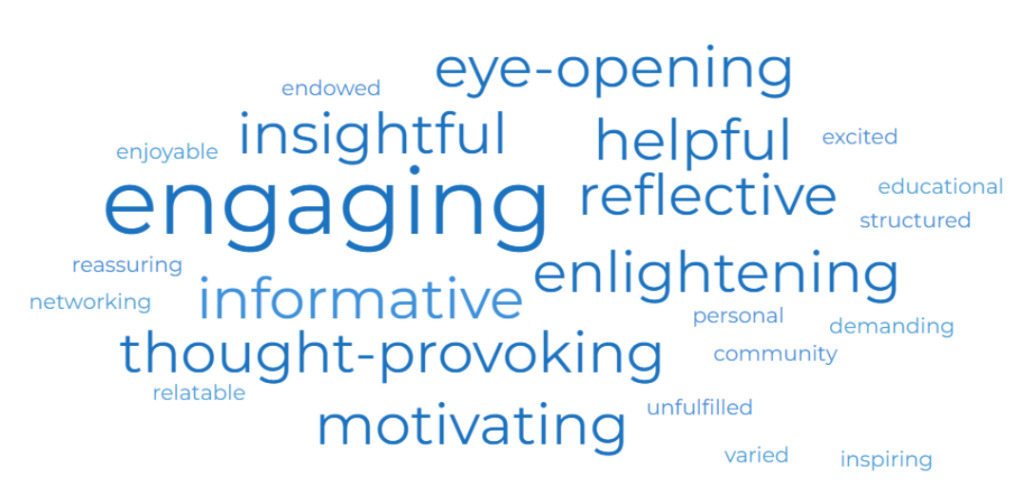
'Prosper helped me realise that I’m doing a lot of things just because I feel the need to do them, rather than focusing on my strengths and long-term goals'
Cohort member feedback
Future plans
'Prosper is an ongoing process in trying to find the right balance and mix of activities for postdoc career development - we created a lot of great materials during the pilots but we are always looking to improve and incorporate postdoc voices and we work to embed it as a living and sustainable resource at the University'
Dr Stefania Silvestri, Researcher Developer, University of Liverpool
Prosper is running another iteration of the cohort between February-July 2025 and is (at the time of writing) in the process of recruiting another 30 participants.
The cohort will be run along the same lines as the 2024 iteration - with some planned changes in response to feedback collected during the formal evaluation and informal focus group:
'Having the headspace to reflect further and by being given information on how to structure CVs, identify strengths weaknesses, strengths and transferable skills means I'm more confident applying for jobs outside of academia.'
Cohort member feedback
- Many cohort members requested more protected time for reflection, discussion and to try out tools presented in development sessions. So in 2025 most development sessions will have an optional 30 minutes after the main session for this, as well as drop-in sessions (‘Career sculpting sessions’) around a week after the development session is delivered, to give postdocs the time and space to apply lessons and reflect.
- Development sessions will no longer be scheduled in the same week as the monthly group coaching sessions, in order to better pace the learning and reflection process.
- Prosper will do more to integrate Portal usage into development sessions, weaving links to resources on the Portal throughout the cohort to give members more direction when it comes to using the Portal to build on what they’ve learned between sessions.
- Cohort members expressed interest in having a session specifically focused around negotiation and influencing skills - so Prosper has commissioned a specialist to deliver this.
- Prosper also intends to slightly re-balance the mix of online/in-person, going from 23% of sessions being in-person to 39% (this is always a tricky balance to get right, given different personal preferences and the need to ensure the cohort is inclusive of those who face barriers to attending in-person events.)
'I cannot undersell the importance of protected time to reflect and plan your own career development and reflect on achievements and strengths moving forward.'
Cohort member feedback
The plan is to continue running these cohorts on an annual basis for the foreseeable future, in order to embed Prosper as a standard benefit for postdocs at the University.

If you're keen on using Prosper within your own institution, or are using it but need some help or advice, do feel free to contact us at prosper.postdoc@liverpool.ac.uk






 Refine
Refine

